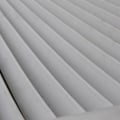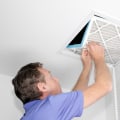In general, most air filters should be changed every 90 days or 3 months. This can vary depending on the location of your home, if you have pets, and the age of your system and equipment.
Fibreglass air filters
are more affordable but less efficient at capturing dust and particles from the air, so they should be changed every 30 days or less. The ideal is to change your air filter every three months, but there are certain factors to consider when determining when to replace an old filter.A general rule for pleated air filters (such as those made by FilterBuy) is to replace the filter every 90 days. As the filter traps more dirt, dust, and allergens from the air, its efficiency decreases. If you live in a big city or an area with poor air quality, cats and dogs in the house, or if your filter is completely covered with dust and dirt, it's a good idea to change it even if it hasn't reached the end of its recommended life. Many homeowners are unaware of how often their air filters need to be replaced, leaving their system open to damage. To locate the engine air filter housing, look for a large plastic box, usually black, placed on top of or on the side of the engine. To ensure that only clean air comes out of your air conditioning system, it's important to change your air filter before it gets clogged so you can breathe better.
You'll find it easier to remember this important task if you first learn how often to change your air filter. As a general rule, most average drivers should be able to work a year or two before needing a new air filter. After a period of smoky days and poor outdoor air quality, inspect the air filter to see if it needs to be changed. While these factors influence how often your air filter is replaced, you should visually inspect it every month to check for excessive particulate matter accumulation. With easy-to-follow instructions, a little determination, and a new air filter, you can easily change your vehicle's air filters on your own with very few or no tools.
As a general rule, lower home occupancy extends the life of the air filter, while higher home occupancy reduces it.



